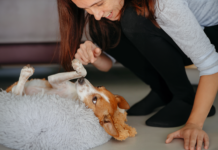Last Updated on March 12, 2024 by Nasir Hanif
When training your Boston Terrier, remember to avoid over-training, as it may make him frustrated. Instead, focus on one or two commands at a time and integrate them into your daily routine. Boston Terriers are very intelligent and will benefit from consistent training. You can begin by using positive reinforcement and avoid using negative words, or you can start with a routine that involves a physical challenge.
Table of Contents
Positive reinforcement
Positive reinforcement is the process of rewarding a dog’s good behavior by offering a treat or praise whenever it demonstrates a desired behavior. Dogs and people alike enjoy the idea of being rewarded for good behavior. The more positive reinforcement is provided, the more likely your dog will associate good behaviors with good things. Positive reinforcement works best when it is consistent, predictable, and reproducible. Additionally, it must be offered immediately after the desired behavior.
Positive reinforcement is important when training a Boston Terrier. It is essential that your training sessions be interactive and fun for your dog. Use toys and games as a way to engage your dog’s interest and make the training more fun and memorable. While Boston Terriers are highly intelligent dogs, it may take some time for them to understand a new command or behavior. In order to make the training sessions more effective, try to incorporate them into your everyday routine.
Avoiding negative words
If you want to train your Boston Terrier to follow your commands, you must avoid using negative words. These words will confuse your dog, and it will also make the situation worse. You must be firm and consistent, but be kind and patient when your dog makes a mistake. Using harsh words and being angry will only make the situation worse.
Routine
Routine is one of the most important factors in Boston Terrier training. It helps to reinforce the desired behavior. It helps you to avoid frustrating your dog by abruptly reprimanding it or rushing through the training process. Instead, try to be consistent and patient. Regardless of whether you’re training a Boston Terrier puppy or a full-grown adult, the goal is to create a routine that will last for the entire dog’s life.
Routine in Boston Terrier training is important for your dog’s health and well-being. It is also essential to understand your dog’s body language and reactions. The more you understand the way your Boston Terrier perceives things, the more effective your training sessions will be.
Physical challenge
Boston Terrier training can be challenging, as these dogs have small bladders. It is important to maintain a calm and consistent demeanor while training your dog. This will help minimize biting behavior and reduce any unwanted interactions between you and your dog. Fortunately, these small dogs can adapt very well to house training.
To start with, Bostons do well with agility exercises. This type of exercise involves running, jumping, and climbing. It may also involve tug toys and balls. These items should be rewarded to encourage the dog to perform well. During training, be sure to praise your Boston whenever he does well.
Behavioral problems
While Boston terriers have an excellent reputation as family pets, they are also known for their aggressive tendencies. If they perceive a threat, they may act aggressively, bark, or lunge at an intruder. These behaviors can be harmful to both you and your dog, but they can be prevented.
Despite the aggressive behavior of some Boston Terriers, they are usually well-behaved and easy to socialize. They do not tend to be aggressive towards other dogs and people, but they do bark when necessary. Socialization begins at a young age, and if a Boston Terrier is obedient and social, he or she won’t develop aggressive behavior later in life.
Conclusion
A solid training plan will go a long way in providing a healthy lifestyle and environment and will have an impact on a Boston Terrier life expectancy. Be sure to invest time into a training program that will best meet the needs of your canine friend.
Apart from this if you are interested to know about your Carpets Regularly then visit our pets category.


























